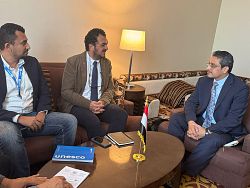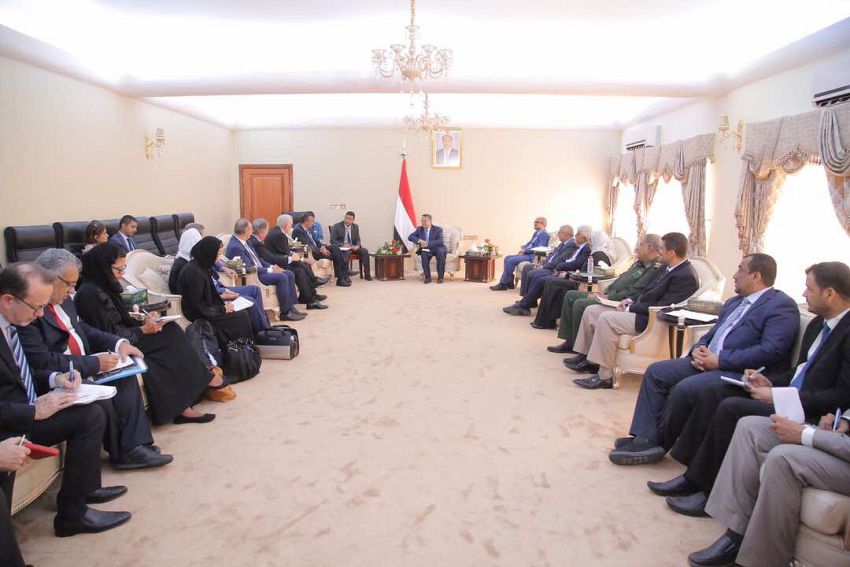
Culture Minister Discusses Strengthening Partnership with UNESCO to Protect Heritage
Minister of Culture and Tourism, Motee'a Dammaj, met on Tuesday with the Project Manager of the United Nations Educational, Scientific and Cultural Organization (UNESCO) in Yemen, Nuno Oliveira, to discuss ways to enhance joint cooperation in the protection of culture and heritage.

Casualty Toll from Israeli Offensive on Gaza Rises to 72,070 Martyrs, 171,738 Injured
The casualty toll from the Israeli occupation’s offensive on the Gaza Strip since October 7, 2023, has risen to 72,070 martyrs and 171,738 injured, according to the Ministry of Health in Gaza.

Korea large companies' exports rise 10 percent
Large companies' exports in South Korea rose approximately 10 percent year-on-year in the fourth quarter of last year, driven by increased global demand for semiconductors.

Saudi League: Al-Nassr, Al-Ettifaq and Neom Secure Victories Over Al-Ittihad, Damac and Al-Riyadh
Al-Nassr defeated its guest Al-Ittihad 2–0 in the match that brought them together at Al-Awwal Park Stadium in Riyadh, as part of the 21st round of the Saudi Professional League.
Last Update: ،
2026/02/25
Time
04:16:45
Latest News:
 Yemen Finance Minister Emphasizes Teamwork to Boost Economy
Yemen Finance Minister Emphasizes Teamwork to Boost Economy
 Yemen Youth Minister Discusses Strategic Cooperation with British Council
Yemen Youth Minister Discusses Strategic Cooperation with British Council
 Health Minister Reviews Healthcare Services in Aden
Health Minister Reviews Healthcare Services in Aden
 Culture Minister Discusses Strengthening Partnership with UNESCO to Protect Heritage
Culture Minister Discusses Strengthening Partnership with UNESCO to Protect Heritage
 Minister of Local Administration discusses with Director of UN Envoy's Office development programs
Minister of Local Administration discusses with Director of UN Envoy's Office development programs
Latest News:
 Yemen Finance Minister Emphasizes Teamwork to Boost Economy
Yemen Finance Minister Emphasizes Teamwork to Boost Economy
 Yemen Youth Minister Discusses Strategic Cooperation with British Council
Yemen Youth Minister Discusses Strategic Cooperation with British Council
 Health Minister Reviews Healthcare Services in Aden
Health Minister Reviews Healthcare Services in Aden
 Culture Minister Discusses Strengthening Partnership with UNESCO to Protect Heritage
Culture Minister Discusses Strengthening Partnership with UNESCO to Protect Heritage
 Minister of Local Administration discusses with Director of UN Envoy's Office development programs
Minister of Local Administration discusses with Director of UN Envoy's Office development programs
PM renews demand to relocate int'l organizations to Aden
[24/07/2017 02:34]
ADEN-SABA
Yemen's Prime Minister Ahmed Obeid bin-Daghr has renewed his demand from the international organizations to relocate their headquarters from the rebel-held Sana'a to the temporary capital city, Aden.
Bin-Daghr renewed the demand during his reception of the UNICEF Executive Director Anthony Lake, the WHO Director-General Dr. Tedros Adhanom Ghebreyesus and the WFP Executive Director David Beasley and their accompanying delegations in Aden on Monday.
The delegations' visit is meant to organize the humanitarian and health relief supply to Yemen.
Bin-Daghr said, once the organizations move, the government will offer support to enable them operate responsibly, transparently and neutrally.
He expressed his hope that the visit will help in alleviating the Yemeni people's suffering induced by the Saleh-Houthi militias coup.
The premier hailed the international organizations' offering of relief aid and helping to curb the epidemic of cholera in health and food fields. "The government is responsile for all the Yemeni people, from Mahrah in the south to Saadah in the north," he said. "The government reaffirms its commitment to partnership with the UN to reduce the impact of the coup d'état on the Yemeni people.
The premier said: "We have paid salaries in all liberated provinces and sent off salaries to the rebel-held parts, just out of our sense of responsibility toward all the people. We have worked in offering basic services in the liberated provinces and asked the UN to press the coup militia into accepting the idea of them sending revenues to us in return for us continuing payment of salaries to (all Yemen's) civil servicemen. Unfortunately this proposal from us was met with rejection. Rather the militias dedicated the revenues in their held areas, estimated at YR 681 billion, as war funds, enough to bankroll the state employees' salaries for nine months."
The premier said the coup militias are responsible for the prevalence of cholera and other epidemics in Yemen, because of their irresponsible practices including the inaction against it, unlike the government which contained the cholera epidemic in its early stages of spread in Aden and neighboring provinces.
The premier thanked the Kingdom of Saudi Arabia, the UAE and other Arab countries backing Yemen as well as all international organizations that assisted Yemen to face the scourge of this disease.
In regards to peace in Yemen, the premier said the shortest way to it is the implementation of the recognized references for peace; the GCC brokered Initiative, the National Dialogue Outcomes and the UNSC Resolution 2216 on Yemen.
Yemen's Prime Minister Ahmed Obeid bin-Daghr has renewed his demand from the international organizations to relocate their headquarters from the rebel-held Sana'a to the temporary capital city, Aden.
Bin-Daghr renewed the demand during his reception of the UNICEF Executive Director Anthony Lake, the WHO Director-General Dr. Tedros Adhanom Ghebreyesus and the WFP Executive Director David Beasley and their accompanying delegations in Aden on Monday.
The delegations' visit is meant to organize the humanitarian and health relief supply to Yemen.
Bin-Daghr said, once the organizations move, the government will offer support to enable them operate responsibly, transparently and neutrally.
He expressed his hope that the visit will help in alleviating the Yemeni people's suffering induced by the Saleh-Houthi militias coup.
The premier hailed the international organizations' offering of relief aid and helping to curb the epidemic of cholera in health and food fields. "The government is responsile for all the Yemeni people, from Mahrah in the south to Saadah in the north," he said. "The government reaffirms its commitment to partnership with the UN to reduce the impact of the coup d'état on the Yemeni people.
The premier said: "We have paid salaries in all liberated provinces and sent off salaries to the rebel-held parts, just out of our sense of responsibility toward all the people. We have worked in offering basic services in the liberated provinces and asked the UN to press the coup militia into accepting the idea of them sending revenues to us in return for us continuing payment of salaries to (all Yemen's) civil servicemen. Unfortunately this proposal from us was met with rejection. Rather the militias dedicated the revenues in their held areas, estimated at YR 681 billion, as war funds, enough to bankroll the state employees' salaries for nine months."
The premier said the coup militias are responsible for the prevalence of cholera and other epidemics in Yemen, because of their irresponsible practices including the inaction against it, unlike the government which contained the cholera epidemic in its early stages of spread in Aden and neighboring provinces.
The premier thanked the Kingdom of Saudi Arabia, the UAE and other Arab countries backing Yemen as well as all international organizations that assisted Yemen to face the scourge of this disease.
In regards to peace in Yemen, the premier said the shortest way to it is the implementation of the recognized references for peace; the GCC brokered Initiative, the National Dialogue Outcomes and the UNSC Resolution 2216 on Yemen.
Key words:
SABA Yemen's - responsibility - implementation - organizations' - Unfortunately - transparently - irresponsible - international - organizations - headquarters - Culture Minister Discusses Strengthening Partnership with UNESCO to Protect Heritage
Culture Minister Discusses Strengthening Partnership with UNESCO to Protect Heritage Yemen Finance Minister Emphasizes Teamwork to Boost Economy
Yemen Finance Minister Emphasizes Teamwork to Boost Economy Yemen Youth Minister Discusses Strategic Cooperation with British Council
Yemen Youth Minister Discusses Strategic Cooperation with British Council Health Minister Reviews Healthcare Services in Aden
Health Minister Reviews Healthcare Services in Aden Culture Minister Discusses Strengthening Partnership with UNESCO to Protect Heritage
Culture Minister Discusses Strengthening Partnership with UNESCO to Protect Heritage Minister of Local Administration discusses with Director of UN Envoy's Office development programs
Minister of Local Administration discusses with Director of UN Envoy's Office development programs  Finance Minister, US Ambassador Discuss Support for Comprehensive Economic Reforms
Finance Minister, US Ambassador Discuss Support for Comprehensive Economic Reforms  Two republican decrees about appointing commander for Special Security Forces, chair for Civil Defense Authority
Two republican decrees about appointing commander for Special Security Forces, chair for Civil Defense Authority Al-Khanbashi confers with Regional Director of NDI over peace, development tracks
Al-Khanbashi confers with Regional Director of NDI over peace, development tracks Minister of Planning discusses with international organizations joint coordination
Minister of Planning discusses with international organizations joint coordination


